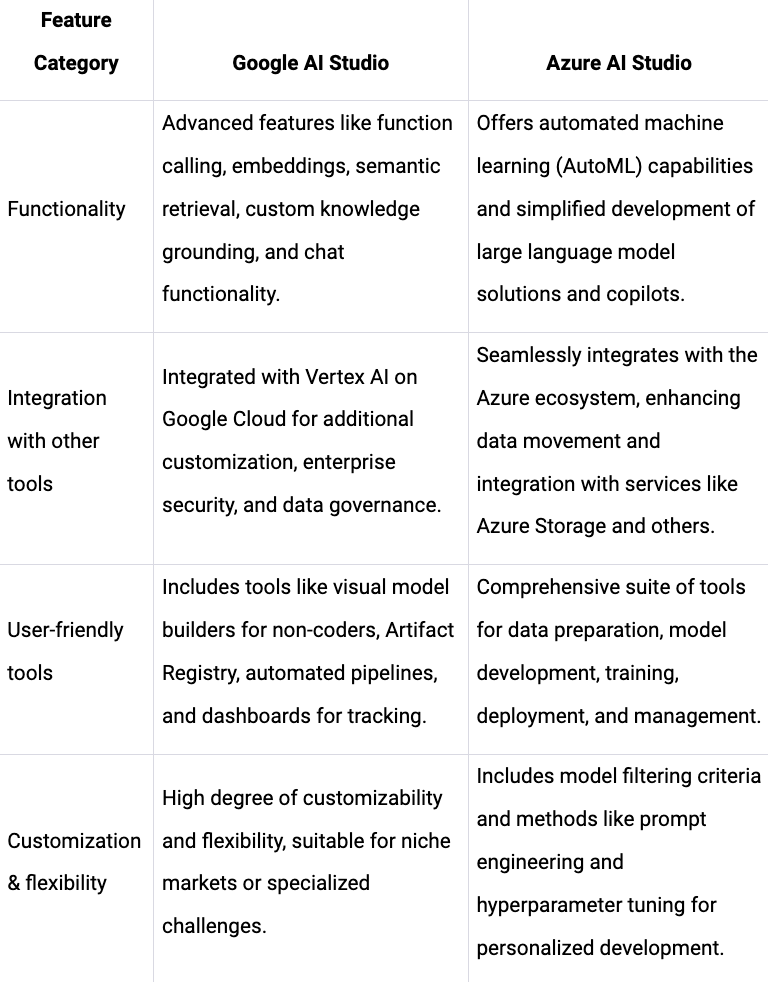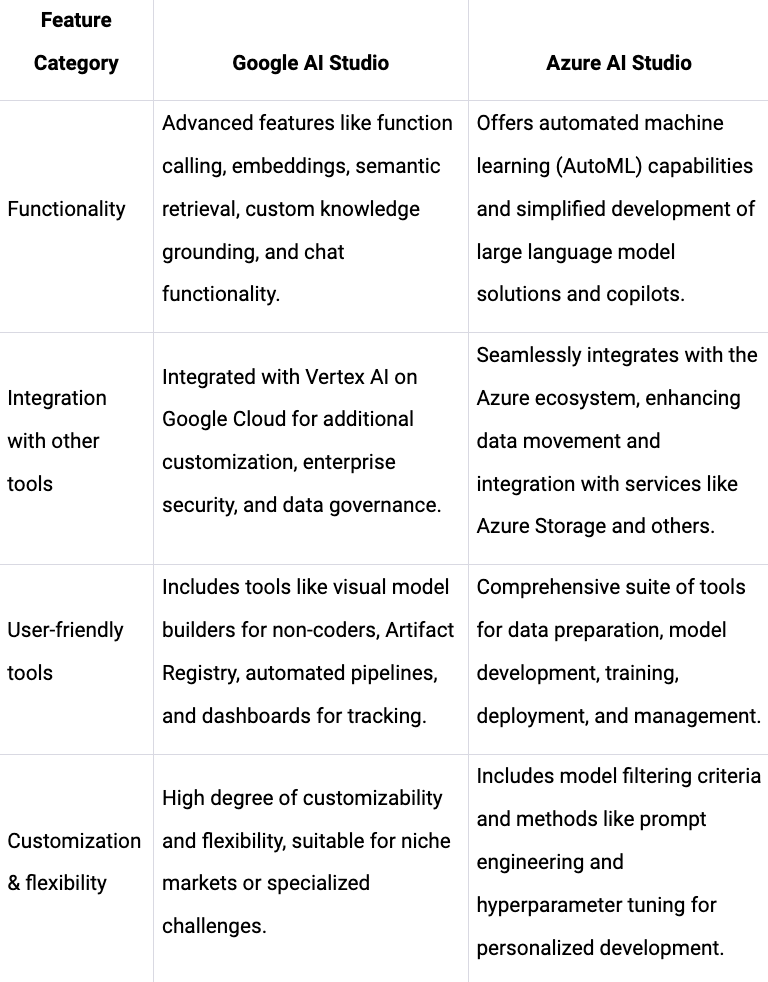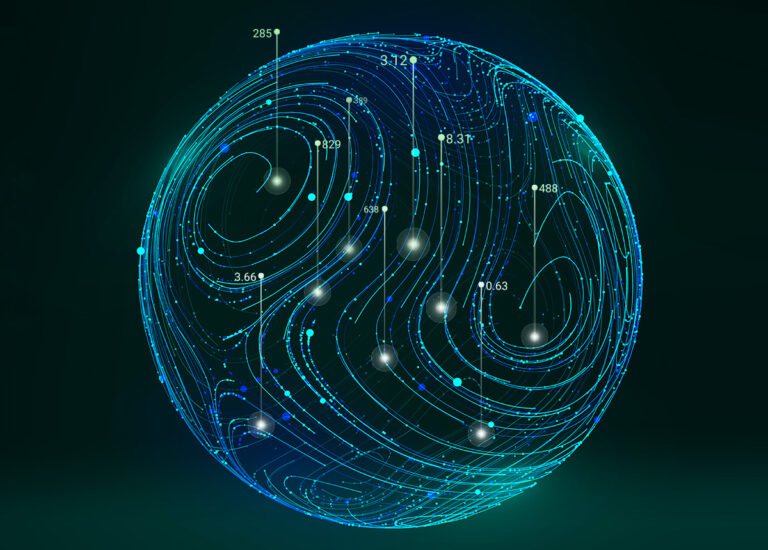The landscape of machine learning and artificial intelligence is a rapidly expanding frontier, with Google AI Studio and Azure AI Studio emerging as key players. Gartner’s Magic Quadrant for Strategic Cloud Platform Services report highlights the strategic importance these providers hold in the realm of enterprise IT infrastructure and platform services.
These platforms represent the pinnacle of AI development tools, each having significant market presence and influence.
In this blog post, we’ll get into what each of these platforms offers, compare their features and capabilities, and explore their real-world applications. Whether you’re a seasoned developer or just starting in the field of AI, this post will provide valuable insights into these two powerful tools.
What is Google AI Studio?
Google AI Studio is a platform by Google that simplifies the integration of Gemini models through a user-friendly and secure API. It offers developers quick prompt development, by allowing them to efficiently convert ideas into code for building generative AI applications.
The EMEA Google Cloud Applied AI Summit was a significant event in the AI community, highlighting the latest advancements in AI technology. Among the key focuses was Google AI Studio, a robust platform that stands at the cutting edge of AI development.
As explained by Google Cloud CEO Thomas Kurian, this platform is a testament to Google’s commitment to advancing AI technology. It offers a suite of tools that enable developers to create sophisticated AI models with ease. It is known for its powerful Tensor Processing Unit (TPU), the Cloud TPU v5p, which offers enhanced performance and scalability.
What is Azure AI Studio?
Azure AI Studio, provided by Microsoft Azure, is a cloud-based environment empowering developers and data scientists with a comprehensive suite of tools and services for efficient AI development and experimentation.
The platform boasts its integration into the larger Azure ecosystem (Azure Storage, Azure Databricks, and Azure Machine Learning) and enhanced data movement. These capabilities offer a collaborative development environment, essential for modern AI development.
Comparative analysis and core features table
The table below provides a snapshot of the core features and distinctions between Google AI Studio and Azure AI Studio, highlighting their strengths and potential areas of consideration. Each platform offers unique benefits tailored to different needs in the AI and machine learning landscape.


The future of AI and ML: Enhanced AI capabilities provided by Google Cloud and Microsoft Azure
Google I/O 2023 was abuzz with a series of GenAI-related announcements, underscoring the pivotal role of Generative AI not just in Google Cloud, but also across its search and enterprise divisions, including Google Workspace. Google’s investment in foundation models – Codey, Chirp, PaLM, and Imagen – marks a significant step in this direction.
These models, accessible through
Vertex AI, offer Google Cloud customers the flexibility to consume and fine-tune them with custom datasets. The models in Vertex AI expands this capability further, featuring both open-source and third-party foundation models. Google has also launched GenAI Studio and no-code tools like Gen App Builder for intuitive app development based on GenAI.
As for Microsoft, Azure’s exclusive partnership with OpenAI positions it at the forefront of the generative AI landscape. Azure OpenAI stands out as one of the most mature and established GenAI platforms in the public cloud arena.
Azure OpenAI integrates a broad range of foundation models from OpenAI, with notable exclusions like
Whisper. These models are readily available through familiar APIs and client libraries.
In addition to these developments, Microsoft has been actively contributing to the open-source community.
Impact on industries
Beyond their contributions to the wider tech community, Google and Azure stand at the forefront of driving substantial advancements in specific industries. The following is a concise overview of the impact of these products on common business domains.
AI’s role in healthcare is set to expand, with Google AI Studio and Azure AI Studio at the forefront. We could see breakthroughs in personalized medicine, diagnostic imaging, and patient care management, all driven by AI’s growing capabilities.
In the retail sector, AI can revolutionize inventory management, customer experience, and personalized marketing. These platforms could provide tools for retailers to better understand and predict consumer behavior.
The finance industry stands to benefit significantly from advancements in AI, particularly in areas like fraud detection, algorithmic trading, and personalized financial planning.
AI could transform the educational landscape by providing personalized learning experiences, automating administrative tasks, and offering new ways to engage and motivate students.
Conclusion
The journey into the future of artificial intelligence and machine learning brings endless possibilities. With Google AI Studio and Azure AI Studio leading the charge, we are embracing a new era where AI not only enhances our daily lives but also drives innovation across all sectors. As these platforms evolve, they will undoubtedly open new horizons, unlocking the full potential of AI and ML.
Eager to be a part of this AI-driven future?
Contact us to explore how Google AI Studio and Azure AI Studio can revolutionize your business or project with cutting-edge AI solutions.






